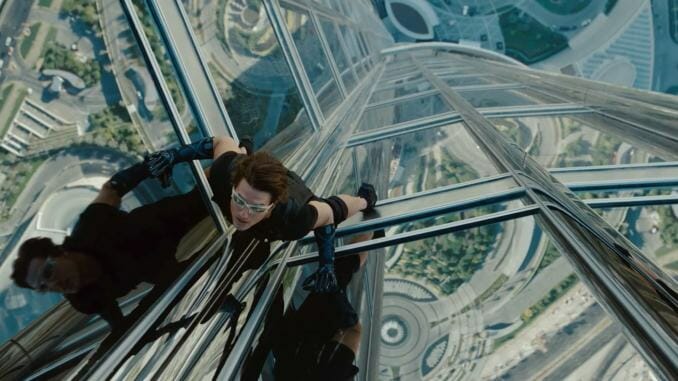
Out of any potential category of movie available to stream on Amazon Prime, thrillers may be the most elusive, mostly because it covers so much ground and Amazon has no real organizing function to delineate between, say, an action/adventure and what may “thrill” its audience.
So, for the (admittedly untenable) purpose of picking the best thrillers on Amazon Prime, we’ve mostly allowed the online retail giant to define what they consider a thriller, from neo-noir to sci-fi, from bleak action to blockbuster suspense. The thrillers Amazon Prime houses aren’t always for the squeamish—and aren’t always the easiest to find.
So here are the 25 best thrillers available to stream with Amazon Prime right now:
1. The Silence of the Lambs Year: 1991
Year: 1991
Director: Jonathan Demme
Stars: Jodie Foster, Anthony Hopkins, Scott Glenn, Ted Levine
Rating: R
Runtime: 118 minutes
The camera hugs her face, maybe trying to protect her though she needs no protection, and maybe just trying to see into her, to see what she sees, to understand why seeing what she sees is so important. Not even 30, Jodie Foster looks so much younger, surrounded in The Silence of the Lambs by men who tower over her, staring at her, flummoxed by her, perhaps wanting to protect her too, but more likely, more ironically, intimidated by a world that would allow such a fragile creature to wander the domain of monsters. As Clarice Starling, FBI agent-in-training, Foster is an innocent who’s seen more than any of us could ever imagine, a warrior who seems unsure of her prowess. That Jonathan Demme—a director who came up under the tutelage of Roger Corman, able to adopt then immediately shed genres at whim—corners Starling within the confines of a “Woman in Peril,” only to watch her shrug off every label thrown at her, is a testament to The Silence of the Lambs as feminist, not because it so thoroughly inhabits a female point of view, but because its violence and fear is the stuff of masculine toxicity. Demme’s film is only the second to adapt Thomas Harris’s Hannibal Lector novels to the screen, but it’s the first to draw undeniable lines between the way men see Clarice Starling and the way that serial killer Buffalo Bill (Ted Levine) projects his neuroses onto his victims. Demme (and Harris) links seeing to transformation to one’s need to consume, all pursued through a gendered lens, represented by the seemingly omniscient perspective of Hannibal Lector (Anthony Hopkins), a borderline asexual cannibal who literally eats those over whom he holds court. Buffalo Bill is a monster, and so is Lector, but the difference is that Lector does not attempt to possess Clarice Starling, though he sees her, because he is in control of that which he consumes. Buffalo Bill isn’t; as a man he believes that by consuming femininity he can become it, too stupid and too self-absorbed to realize that consumption is deletion, that wanting to protect a woman is only a matter of admitting that the World of Men is a weak and evil failure of the very ideals it strives to preserve. —Dom Sinacola
2. Robocop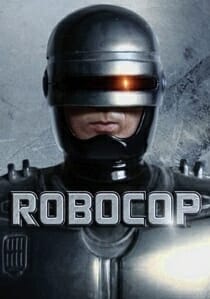 Year: 1987
Year: 1987
Director: Paul Verhoeven
Stars: Peter Weller, Nancy Allen, Miguel Ferrer, Ronny Cox, Kurtwood Smith
Rating: R
Runtime: 103 minutes
Throughout the late-’70s and indulgent 1980s, “industry” went pejorative and Corporate America bleached white all but the most functional of blue collars. Broadly speaking, of course: Manufacturing was booming, but the homegrown “Big Three” automobile companies in Detroit—facing astronomical gas prices via the growth of OPEC, as well as increasing foreign competition and the decentralization of their labor force—resorted to drastic cost-cutting measures, investing in automation (which of course put thousands of people out of work, closing a number of plants) and moving facilities to “low-wage” countries (further decimating all hope for a secure assembly line job in the area). The impact of such a massive tectonic shift in the very foundation of the auto industry pushed aftershocks felt, of course, throughout the Rust Belt and the Midwest—but for Detroit, whose essence seemed composed almost wholly of exhaust fumes, the change left the city in an ever-present state of decay. And so, though it was filmed in Pittsburgh and around Texas, Detroit is the only logical city for a Robocop to inhabit. A practically peerless, putrid, brash concoction of social consciousness, ultra-violence and existential curiosity, Paul Verhoeven’s first Hollywood feature made its tenor clear: A new industrial revolution must take place not within the ranks of the unions or inside board rooms, but within the self. By 1987, much of the city was already in complete disarray, the closing of Michigan Central Station—and the admission that Detroit was no longer a vital hub of commerce—barely a year away, but its role as poster child for the Downfall of Western Civilization had yet to gain any real traction. Verhoeven screamed this notion alive. He made Detroit’s decay tactile, visceral and immeasurably loud, limning it in ideas about the limits of human identity and the hilarity of consumer culture. As Verhoeven passed a Christ-like cyborg—a true melding of man and savior—through the crumbling post-apocalyptic fringes of a part of the world that once held so much prosperity and hope, he wasn’t pointing to the hellscape of future Detroit as the battlefield over which the working class will fight against the greedy 1%, but instead to the robot cop, to Murphy (Peter Weller), as the battlefield unto himself. How can any of us save a place like Detroit? In Robocop, it’s a deeply personal matter. —Dom Sinacola
3. Mission: Impossible – Ghost Protocol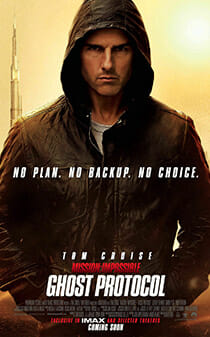 Year: 2011
Year: 2011
Director: Brad Bird
Stars: Tom Cruise, Jeremy Renner, Simon Pegg, Paula Patton
Rating: PG-13
Runtime: 132 minutes
While Christopher McQuarrie continues to codify Tom Cruise as the asexual ubermensch of our action franchise dreams, it took an animator to realize what wonders could be unleashed when directing the superstar like one would a cartoon character. Tom Cruise can do things normal people can’t, maybe because normal people won’t, though Tom Cruise might just say that normal people don’t, the man’s career providing ample evidence that he believes he can do things normal people can’t because he does them. His impossible mission is himself; Brad Bird understood this. The fourth Mission: Impossible movie, then, is a testament to Tom Cruise’s logic, to having him do astounding things because he’s doing them, for us, to both show us what we could do if only we were doing it, and to entertain us, because he’s nothing if not a consummately entertaining performer. When Ethan Hunt (Cruise) clambers over the exterior of the Burj Khalifa, Bird captures Cruise with the open-faced awe of a director who can’t believe the malleable specimen he’s got in his grasp. When the Kremlin implodes with more than a hint of disaster porn footage, or when Ethan Hunt’s outrunning an all-consuming sandstorm, or when Ethan Hunt’s escaping from a maximum security prison in Moscow, Bird’s imagination spews from every spectacle, America’s favorite ridiculous leading man at the heart of it all, looking chiseled and genial but also like he doesn’t understand human touch. This is Cruise’s gift to Bird, and this is Bird’s gift to us, paying it forward. —Dom Sinacola
4. You Were Never Really Here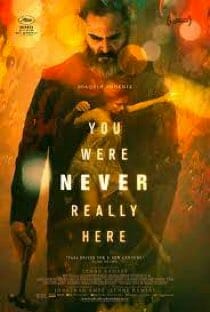 Year: 2018
Year: 2018
Director: Lynne Ramsay
Stars: Joaquin Phoenix, Ekaterina Samsonov, John Doman, Judith Roberts, Alex Manette, Alessandro Nivola
Rating: R
Lynne Ramsay has a reputation for being uncompromising. In industry patois, that means she has a reputation for being “difficult.” Frankly, the word that best describes her is “unrelenting.” Filmmakers as in charge of their aesthetic as Ramsay are rare. Rarer still are filmmakers who wield so much control without leaving a trace of ego on the screen. If you’ve seen any of the three films she made between 1999 and 2011 (Ratcatcher, Morvern Callar, We Need to Talk About Kevin), then you’ve seen her dogged loyalty to her vision in action, whether that vision is haunting, horrific or just plain bizarre. She’s as forceful as she is delicate. Her fourth film, You Were Never Really Here—haunting, horrific and bizarre all at once—is arguably her masterpiece, a film that treads the line delineating violence from tenderness in her body of work. Calling it a revenge movie doesn’t do it justice. It’s more like a sustained scream. You Were Never Really Here’s title is constructed of layers, the first outlining the composure of her protagonist, Joe (Joaquin Phoenix, acting behind a beard that’d make the Robertson clan jealous), a military veteran and former federal agent as blistering in his savagery as in his self-regard. Joe lives his life flitting between past and present, hallucination and reality. Even when he physically occupies a space, he’s confined in his head, reliving horrors encountered in combat, in the field and in his childhood on a non-stop, simultaneous loop. Each of her previous movies captures human collapse in slow motion. You Were Never Really Here is a breakdown shot in hyperdrive, lean, economic, utterly ruthless and made with fiery craftsmanship. Let this be the language we use to characterize her reputation as one of the best filmmakers working today. —Andy Crump
5. Fight Club Year: 1999
Year: 1999
Director: David Fincher
Stars: Brad Pitt, Edward Norton, Helena Bonham Carter, Meat Loaf
Rating: R
Runtime: 139 minutes
Based on the mind-bending novel by Chuck Palahniuk, the film version of Fight Club improves on its source. Thank you, David Fincher. Both Brad Pitt and Edward Norton can chalk their performances up as “best role” material. It’s a gritty thriller that features violence as a tool to cope with life’s mundanity, and the dangers that accompany that line of thinking. Most people who didn’t read the book were probably just as surprised about the ending as they were when Meat Loaf popped up in the film. Fight Club is one of the best movies of the ‘90s. Period. If you have a problem with that, then maybe we should step outside. —Shawn Christ
6. No Time To Die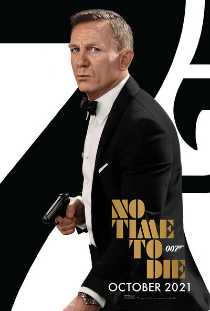 Year: 2021
Year: 2021
Director:Cary Joji Fukunaga
Stars: Daniel Craig, Lea Seydoux, Rami Malek, Ben Whishaw, Lashana Lynch, Naomie Harris, Ralph Fiennes, Jeffrey Wright, Ana de Armas, Christoph Waltz
Rating: PG-13
It’s telling that Craig’s swan song No Time to Die being the longest Bond ever, at a superhero-sized 163 minutes, probably won’t inspire as much public self-flagellation as the leaner, meaner Quantum. No Time to Die is neither lean nor mean; it’s a hard-working attempt to reconcile the Bond rituals with a series-finale emotional weight that these movies have been accumulating (with mixed success) since 2006. Apparently, that reconciliation process takes time: Director Cary Joji Fukunaga (or, more likely, Eon Productions, the tight-gripped caretakers of the Bond franchise) is so unwilling to drop either aspect of this opus that it often feels like two movies in one, both feature-length. So pronounced is the movie’s two-track approach that many of its story elements feel doubled: The opening sequence is a bit of creepy, horror-tinged backstory for Lea Seydoux’s Madeleine Swann (first introduced in the half-lackluster Spectre) and a big Bond action sequence jostling him out of retirement. It feels like 30 minutes before the opening titles finally roll. Then, after those credits, it’s five years later, and the movie gives us a whole other Bond retirement, this time in Jamaica rather than Italy. If it seems like the characters, locations and plot turns keep on coming, and that it’s impossible to keep from mentioning the other Craig Bonds that have preceded it, that’s very much the experience of watching No Time to Die—and not always unpleasantly. If you can accept a saga-fication of Bond, with callbacks and plot threads and interconnections, it’s, at minimum, less of a Forever Franchise than the endlessly self-teasing superhero mythologies (ironic, given that this is the most forever of franchises). This movie really does want to tie the extended Craig era—longest in years, though not in total output—together. Despite the craft on display, No Time to Die lacks pantheon-level Bond action sequences. Cuba is terrific fun, Fukunaga stages a solid late-movie one-take stairwell fight and the big/delayed opener delivers. But the movie is more concerned with the human stuff, a decision that’s by turns hubristic, heartening and unprecedented. (Well, not entirely. On Her Majesty’s Secret Service tried something different, and the filmmakers show their belated appreciation for that once-maligned Bond classic here.) The emotional weight it’s trying to foist onto its loyal audience doesn’t always feel earned, just because it’s tricky to parse what, if anything, the movie is actually trying to say about a James Bond who has spent the majority of five movies beginning and ending, sometimes on a loop. Yet fans may welcome the chance to watch the series struggle against its conventions: Are these performances good, for example, or are all the good guys just beautiful? Is this movie visually sumptuous or was it just shot on film? Has James Bond been deepened, or just weathered? As neatly as No Time to Die wraps up, its certainty is ultimately limited to the last line of the credits: James Bond Will Return. How is another question altogether.—Jesse Hassenger
7. Detour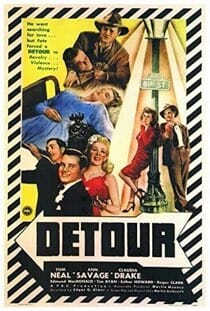 Year: 1945
Year: 1945
Director: Edgar G. Ulmer
Stars: Tom Neal, Ann Savage, Claudia Drake, Edmund MacDonald
A Poverty Row staple with an unknown cast peering into the post-war dark night of the soul, Detour has come to embody the best film noir has to offer—namely, that budget and schedule concerns indirectly enriched the artistic product, paring down a weightier script and even more bloated source novel into a precise, exquisitely sharp bit of storytelling economy. Trapped within the sweaty mind of always-broke jazz pianist Al Roberts (Tom Neal) as he heads West from New York to settle down with his girlfriend (Claudia Drake), a symbol of stable life for Roberts who absconded with his heart to try to “make it” in Hollywood, we’re stuck with only the unlucky guy’s version of events throughout his increasingly desperate trip. After all, his hitchhiking journey seems doomed to fail from the start, but it grows damn near bleak with the accidental cadaver-ing of a gregarious Charles Haskell (Edmund MacDonald) following a whirlwind buddy meet-cute, and then completely hopeless with the introduction of Vera (Ann Savage), an iconic femme fatale who doesn’t have to try hard to ensnare Roberts, by that point so far out of his league he’s got his pants pulled up well past his nipples. As much an efficient encapsulation of its genre as it is a noir drowning entirely within its own hell-bent nightmare, Detour is most impressive for how gracefully Ulmer can get the most out of so little. —Dom Sinacola
8. The Vast of Night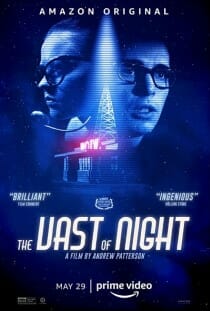 Year: 2019
Year: 2019
Director: Andrew Patterson
Starring: Sierra McCormick, Jake Horowitz
Rating: PG-13
The Vast of Night is the kind of sci-fi film that seeps into your deep memory and feels like something you heard on the news, observed in a dream, or were told in a bar. Director Andrew Patterson’s small-town hymn to analog and aliens is built from long, talky takes and quick-cut sequences of manipulating technology. Effectively a ‘50s two-hander between audio enthusiasts (Sierra McCormick and Jake Horowitz playing a switchboard operator and disc jockey, respectively) the film is a quilted fable of story layers, anecdotes and conversations stacking and interweaving warmth before yanking off the covers. The effectiveness of the dusty locale and its inhabitants, forged from a high school basketball game and one-sided phone conversations (the latter of which are perfect examples of McCormick’s confident performance and writers James Montague and Craig W. Sanger’s sharp script), only makes its inevitable UFO-in-the-desert destination even better. Comfort and friendship drop in with an easy swagger and a torrent of words, which makes the sensory silence (quieting down to focus on a frequency or dropping out the visuals to focus on a single, mysterious radio caller) almost holy. It’s mythology at its finest, an origin story that makes extraterrestrial obsession seem as natural and as part of our curious lives as its many social snapshots. The beautiful ode to all things that go [UNINTELLIGIBLE BUZZING] in the night is an indie inspiration to future Fox Mulders everywhere. —Jacob Oller
9. The Invisible Man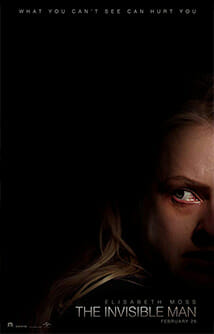 Year: 2020
Year: 2020
Director: Leigh Whannell
Stars: Elisabeth Moss, Oliver Jackson-Cohen, Harriet Dyer, Aldis Hodge, Storm Reid, Michael Dorman
Rating: R
Aided by elemental forces, her exquisitely wealthy boyfriend’s Silicon Valley house blanketed by the deafening crash of ocean waves, Cecilia (Elisabeth Moss) softly pads her way out of bed, through the high-tech laboratory, escaping over the wall of his compound and into the car of her sister (Harriet Dyer). We wonder: Why would she run like this if she weren’t abused? Why would she have a secret compartment in their closet where she can stow an away bag? Then Cecilia’s boyfriend appears next to the car and punches in its window. His name is Adrian Griffin (Oliver Jackson-Cohen), and according to Cecilia, Adrian made a fortune as a leading figure in “optics” (OPTICS!) meeting the self-described “suburban girl” at a party a few years before. Never one to be subtle with his themes, Leigh Whannell has his villain be a genius in the technology of “seeing,” in how we see, to update James Whale’s 1933 Universal Monster film—and H.G. Wells’ story—to embrace digital technology as our primary mode of modern sight. Surveillance cameras limn every inch of Adrian’s home; later he’ll use a simple email to ruin Cecilia’s relationship with her sister. He has the money and resources to peer into any corner of Cecilia’s life. His gaze is unbroken. Cecilia knows that Adrian will always find her, and The Invisible Man is rife with the abject terror of such vulnerability. Whannell and cinematographer Stefan Duscio have a knack for letting their frames linger with space, drawing our attention to where we, and Cecilia, know an unseen danger lurks. Of course, we’re always betrayed: Corners of rooms and silhouette-less doorways aren’t empty, aren’t negative, but pregnant with assumption—until they aren’t, the invisible man never precisely where we expect him to be. We begin to doubt ourselves; we’re punished by tension, and we feel like we deserve it. It’s all pretty marvelous stuff, as much a well-oiled genre machine as it is yet another showcase for Elisabeth Moss’s herculean prowess. —Dom Sinacola
10. Face/Off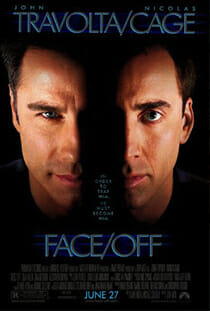 Year: 1997
Year: 1997
Director: John Woo
Stars: Nicolas Cage, John Travolta
One of the best action bonanzas of the ’90s begins with the murder of a small boy, and the following 130 brilliant, dove-dunked, borderline lysergic minutes do nothing to denounce the glorious shamelessness of those very first moments. Contrary to contemporary narratives, Nicolas Cage has always been a bit much, but as swaggering sociopath Castor Troy (and then as traumatized lawman Sean Archer), the Oscar-winning actor seems to realize that everything has been building to this Face/Off, that perhaps he had been put on this earth for the sake of this film, and that director John Woo—already an action maestro by this point with The Killer, Hardboiled and Hard Target—should be his Metatron, recording and overseeing this important time in the Realm of Humans. Similarly, John Travolta leans just as hard into his half of the two-hander, saddled with the added pressure of playing a bad guy who’s playing a dad who lasciviously stares at “his” own teenage daughter, encouraging her to smoke by basically flirting with her, and like most Travolta performances from the past 20 years, fails spectacularly to not make it weird. With a plot (FBI agent undergoes experimental face surgery to pretend to be super criminal in order to trick super criminal’s less-super criminal brother into revealing the location of a bomb) that makes way less sense as a Wikipedia synopsis than it does on-screen, Face/Off should be a disaster. And hoo boy is it ever—plus a landmark in action filmmaking.—Dom Sinacola
11. AmbulanceRelease Date: April 8, 2022
Director: Michael Bay
Stars: Yahya Abdul-Mateen II, Eiza González, Jake Gyllenhaal, Garret Dillahunt, Keir O’Donnell, Olivia Stambouliah, Jackson White, A Martinez, Cedric Sanders
Rating: R
If Ambulance, Michael Bay’s 15th feature currently basking in a gleeful critical reappraisal of Bay’s canon, feels as entelechial as Bad Boys II, it can only be because Bay has found himself in the absolute best time to be Bay. Though an ensemble of Angelenos fills out the film as it barrels to pretty much the only conclusion it could have, Ambulance is about as tidy as a Michael Bay film can get. Within ten minutes we’re deep in Ambulance: Strapped for money to pay his wife’s escalating medical bills, let alone care for their infant son, Will Sharp (Yahya Abdul-Mateen II) agrees to join his adoptive brother Danny (Jake Gyllenhaal, always a joy to behold) on one last big score, a bank heist that goes inevitably wrong. Subsequently, they shoot a cop (Jackson White) and commandeer the cop’s ambulance, also occupied by the “best” EMT in L.A., Cam Thompson (Eiza González)—just one more embittered soul in the grand gray tapestry that is the City of Angels. As Danny loses control and Will more and more accepts his fate as the offspring of a fabled bank-robbing psychopath, their bank robber father spoken of in hushed tones and unbelievable stories, the entire militarized might of the LAPD descends upon the stolen ambulance, led by Captain Monroe (Garret Dillahunt), a man who festishizes the police enough that Bay doesn’t have to. Even when FBI Agent Clark (Keir O’Donnell) gets involved, he’s only invited into Monroe’s inner circle because he went to college with Danny. Bad Boys and the fever dream of Bad Boys II are about how Michael Bay thinks that cops must be psychopaths in order to confront a modern psychopathic world. In Ambulance, as much as his vision of the LAPD comprises sophisticated surveillance and world-killing artillery to rival the most elite military power of the U.S. government—making sure it all looks really fucking cool—he also makes sure to interrupt an especially destructive chase sequence (as he once had Martin Lawrence declare the events happening on screen obligatory and nothing else) among so many especially destructive chase sequences, to have Monroe’s left hand, Lieutenant Dhazghig (Olivia Stambouliah), tell him how many tax dollars they’re annihilating. Later, many, many police officers die in explosions and hails of gunfire, bodies indiscriminately everywhere. One detects glee in these scenes, as if Bay’s countering Monroe’s dismissal of so many flagrantly abused tax dollars by blowing up half the LAPD in a spectacle that practically demands applause. Maybe Michael Bay no longer sees the utility in unleashing psychopathic cops on a psychopathic world, but maybe he never did. In Bay’s L.A., there are no sides, no good guys and bad guys, just a person who “saves my life” or doesn’t—just people with holes punched into their bodies and people without. This is Bay’s distinction between the “haves” and “have nots”: People who have mortal trauma and people who don’t. The film’s disposable blue collar Italian lump, Randazzo (Randazzo Marc), puts it simply: “L.A. drivers! They’re all mamalukes.” Behold this urban wasteland of struggling mamalukes—it teems with more style than we’ll ever deserve.—Dom Sinacola
12. We Need to Talk About Kevin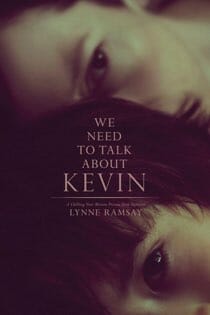 Year: 2012
Year: 2012
Director: Lynne Ramsay
Stars: Tilda Swinton, John C. Reilly, Ezra Miller
Rating: R
We Need To Talk About Kevin concerns the experience of a mother (Tilda Swinton) struggling with the aftermath of a school massacre carried out by her son (Ezra Miller). In its narrative construction, it draws upon two key tropes: that of the “whydunnit” thriller, in which the mystery of the perpetrator’s motivations are a driving factor, and that of the family horror, in which some dark element tears a traditional household apart. Indeed, the real horror is not that a teenager chose total negation over the banality of normative family life—it’s that these appeared to be the only two choices available. Tilda Swinton is brilliant in the starring role as a mother who grapples with guilt about what her son has done and reflects on his childhood, wondering what, if anything, could possibly have been done differently when one gives birth to a “bad seed.” The heartbreaking nature of the film is perfectly encapsulated by the scene wherein Kevin as a child briefly drops his sociopathic tendencies while ill, giving Swinton’s character a brief chance to feel like a cherished mother, only to emotionally shut her out again as soon as his physical health returns, dashing her hopes that some kind of breakthrough had been made. —Donal Foreman
13. Skyfall Year: 2012
Year: 2012
Director: Sam Mendes
Starring: Daniel Craig, Judi Dench, Javier Bardem, Ralph Fiennes, Naomie Harris, Bérénice Marlohe, Ben Whishaw, Albert Finney
Rating: PG-13
Skyfall opens with a spectacular chase scene through Istanbul that is pure action and vintage Bond, with multiple vehicles and crazy stunts, which segues seamlessly into the animated opening credits and the beautiful, haunting strains of Adele. Daniel Craig is unsurprisingly excellent as Bond. This time 007 has to follow the trail of a stolen list of undercover NATO operatives—dangerous information in the wrong hands. Those wrong hands belong to Mr. Silva (Javier Bardem), a nasty cyber-terrorist with a mad-on for MI6 in general and for its director, M, in particular, once again played with firm, effortless command by Judi Dench. Bardem’s Silva is a throwback to a more traditional Bond villain, with equal parts creepy sensuality, intelligence, and psychopathy, and a touch of physical deformity for good measure. Bond is able to once again play the charming lothario, trading cheesy innuendos with MI6 agent Eve (Naomie Harris) and Sévérine (Bérénice Marlohe), a moll of Silva’s as stunningly beautiful as she is inconsequential. Director Sam Mendes keeps the action moving well, and special mention should go to veteran cinematographer Roger Deakins and the art design team, who stage some beautiful sequences like a smackdown in a Shanghai office building silhouetted against a huge, changing blue-and-white neon sign. —Dan Kaufman
14. Heathers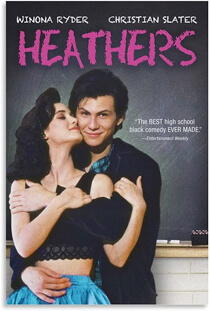 Year: 1989
Year: 1989
Director: Michael Lehmann
Stars: Winona Ryder, Christian Slater, Kim Walker
Rating: R
As much an homage to ’80s teen romps—care of stalwarts like John Hughes and Cameron Crowe—as it is an attempt to push that genre to its near tasteless extremes, Heathers is a hilarious glimpse into the festering core of the teenage id, all sunglasses and cigarettes and jail bait and misunderstood kitsch. Like any coming-of-age teen soap opera, much of the film’s appeal is in its vaunting of style over substance—coining whole ways of speaking, dressing and posturing for an impressionable generation brought up on Hollywood tropes—but Heathers embraces its style as an essential keystone to filmmaking, recognizing that even the most bloated melodrama can be sold through a well-manicured image. And some of Heathers’ images are indelible: J.D. (Christian Slater) whipping out a gun on some school bullies in the lunch room, or Veronica (Winona Ryder) passively lighting her cigarette with the flames licking from the explosion of her former boyfriend. It makes sense that writer Daniel Waters originally wanted Stanley Kubrick to direct his script: Heathers is a filmmaker’s (teen) film. —Dom Sinacola
15. Battle Royale Year: 2000
Year: 2000
Director: Kinji Fukasaku
Stars: Tatsuya Fujiwara, Aki Maeda, Tarô Yamamoto
Rating: R
It’s OK to compare Battle Royale to The Hunger Games movies—or, rather, to find how the lasting accomplishments of the latter franchise were essentially done better and with so much more efficiency by the former—because you probably will anyway. Battle Royale, like the immensely successful four-film crash course in crafting an action star who is really only a symbol of an action star, chronicles a government-sanctioned battle to the death between a group of teens on a weird, weapon-strewn island. (There are even regular island-wide announcements of the day’s dead as the sun sets on the remaining children.) Yet, Battle Royale is so lean in its exposition, so uninterested in dragging out its symbolism or metaphor, that one can’t help but marvel at how cleanly Fukasaku (who had a full career behind him when he made this, only three years before he died) can lend depth to these children, building stakes around them to the point that their deaths matter and their doomed plights sting. What the director can do with such a tenuous premise (which The Hunger Games takes multiple films to do, and without a single ounce of levity) is astounding—plus, he wrangled Beat Takeshi Kitano to play the President Snow-type character, which Kitano does to near-perfection. That Battle Royale II sets out to up the stakes of the first film, especially given the first film’s crazy success in Japan, is to be expected, but stick to the first: Battle Royale will make you care about kids murdering each other more than you (probably) would anyway. —Dom Sinacola
16. The Neon Demon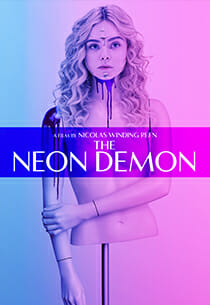 Year: 2016
Year: 2016
Director: Nicolas Winding Refn
Stars: Elle Fanning, Karl Glusman, Jena Malone, Bella Heathcote, Abbey Lee, Desmond Harrington, Christina Hendricks, Keanu Reeves
Rating: R
If Nicolas Winding Refn—anthropomorphic cologne bottle; asexual jaguar—is going to make a horror film, Nicolas Winding Refn will make a horror film about the things that scare Nicolas Winding Refn most: asymmetry, sex, fatherhood. In The Neon Demon, every character is either someone’s daughter or a deranged daddy figure, both thirsty for the kind of flesh only Los Angeles can provide, the roles of predator and prey in constant, unnerving flux. Part cannibal-slasher movie and part endlessly pretty car commercial, Refn’s film about a young model (Elle Fanning) making it in the fashion industry goes exactly where you think it’s going to go, even when it’s trying as hard as it can to be weird as fuck. But despite his best efforts, Refn sustains such an overarching, creeping atmosphere of despair—such a deeply ingrained sense of looming physical imperfection, of death—that it never really matters if The Neon Demon doesn’t add up to much of anything in the end. —Dom Sinacola
17. The Handmaiden Year: 2016
Year: 2016
Director: Park Chan-wook
Stars: Kim Tae-ri, Kim Min-hee, Ha Jung-woo, Cho Jin-woong
Rating: NR
There are few filmmakers on Earth capable of crafting the experience of movies like The Handmaiden so exquisitely while maintaining both plot inertia and a sense of fun. (Yes, it’s true: Park has made a genuinely fun, and often surprisingly, bleakly funny, picture.) The film begins somberly enough, settling on a tearful farewell scene as Sook-hee (Kim Tae-ri) is carted off to the manor of the reclusive and exorbitantly rich aristocrat Kouzuki (Cho Jin-woong), where she will act as servant to his niece, Lady Hideko (Kim Min-hee). But Sook-hee isn’t a maid: She’s a pickpocket working on behalf of Fujiwara (Ha Jung-woo), a conman scheming to get his mitts on Hideko’s assets. (That’s not a euphemism. He only wants her for her money.) The reveal of Sook-hee’s true intentions is just the first of many on The Handmaiden’s narrative itinerary. Park has designed the film as a puzzle box where each step taken to find the solution answers one question while posing new ones at the same time. But you’re here to read about the sex, aren’t you? It’s in the sex scenes between the two Kims that Park shows the kind of filmmaker he really is. The sex is sexy, the scenes steamy, but in each we find a tenderness that invites us to read them as romance rather than as pornography. We’re not conditioned to look for humanity in pantomimes of a sexually explicit nature, but that’s exactly when The Handmaiden is at its most human. There’s something comforting in that, and in Park’s framing of deviance as embodied by the film’s masculine component. We don’t really need him to spell that out for us, but the message is welcome all the same. —Andy Crump
18. The Girl with the Dragon Tattoo Year: 2011
Year: 2011
Director: David Fincher
Stars: Daniel Craig, Rooney Mara, Christopher Plummer, Stellan Skarsgård, Steven Berkoff, Robin Wright, Yorick van Wageningen, Joely Richardson
Rating: R
The Girl with the Dragon Tattoo remains David Fincher’s most underappreciated movie due to its brutal nature and heavy subject matter. Adapted from the first installment of Stieg Larsson’s best-selling Swedish Millennium series, The Girl with the Dragon Tattoo centers on Mikael Blomkvist (played by Daniel Craig between James Bond duties), a recently disgraced journalist dealing with the fallout of a libel suit that destroyed his reputation and the publication he runs with longtime lover/business partner Erika (Robin Wright). When approached by wealthy industrialist Henrik Vanger (the late, great Christopher Plummer) to investigate the decades-old disappearance and presumed murder of his then-16-year-old grandniece Harriet in exchange for a healthy sum of money and, more importantly, information pertaining to the billionaire who destroyed Mikael’s career, he jumps at the chance in the hopes that it’ll be a win-win situation. While we meet the titular girl with the dragon tattoo, Lisbeth Salander (Rooney Mara), within the first few minutes, it takes almost an hour for her narrative to join Mikael’s. Fincher never wastes a moment, creating a rich and fleshed-out adaptation that surprisingly never overstays its welcome. Using an unconventional five-act structure, no part of the story feels rushed. Steven Zaillian’s script allows us to get to know the core pair before the action begins, giving Fincher the room to explore every detail despite packing in so much. Kirk Baxter and Angus Wall’s editing helps transform Dragon Tattoo, which could’ve easily ended up being dense, into something fully absorbing: Seemingly mundane and unnecessary moments (like Lisbeth riding the subway or eating at McDonalds) become fully worth our attention. Balancing these with the stark setting, they build tension while also insisting that no detail is too small. While crafted to near-perfection, from stunning visuals that beautifully capture the dark and snowy Swedish backdrop to the editing and score that perfectly match the tone, it’s still certainly not Fincher’s most accessible film—either in the crime-thriller genre or his filmography in general. —Jihane Bousfiha
19. Ash Is Purest White Year: 2018
Year: 2018
Director: Jia Zhangke
Stars: Tao Zhiao, Fan Liao
Rating: NR
Ash Is Purest White’s story spans decades, a staggeringly beautiful epic, as comedic as it is heartbreaking, that stills feels impossibly intimate—confined, even, and not by space or imagery, but by emotion. China, over the decades through which the film sweeps, tumbles amidst modernization with little care for those who can’t afford to change with the times. Then there is love, passion and crime: At its heart, Ash Is Purest White is a romance between two criminals, Qiao (Tao Zhao) and Bin (Fan Liao). They are serious people with serious demeanors, their day-to-day lives oscillating between the nothingness of a routine lifestyle and violence. Yet, the violence is rarely ever seen—though when it is, Zhangke Jia directs it with a sense of relentless desperation and urgency—and most of the violence of the emotional sort. Yet, there is also a grand sense of human comedy that hangs over the film’s proceedings, as the stories of Jia’s core characters reflect China at large: Everything is changing, nothing is sacred, the past pales in comparison to the rapidly approaching future. Reality can be fought, but time is inescapable—always encroaching and always passing us by. —Cole Henry
20. The Transporter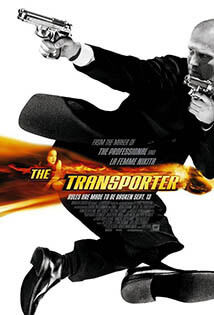 Year: 2002
Year: 2002
Director: Louis Leterrier
Stars: Jason Statham, Qi Shu, Franois Berland
Rating: PG-13
Before The Transporter, Jason Statham was, as far as most audiences knew, more cockney thug than lithe action beast, but after The Transporter came the frenetic shitstorm of Crank, followed by War, which pitted him against none other than Jet Li—so we can pretty much thank Louis Leterrier for believing in Statham’s martial arts prowess enough to give him both the right playground to inhabit and the license to take it apart. Imagine him a gruffer cousin to Jean-Claude Van Damme, just as given to finding himself shirtless, but more apt to preserve his mopey loner status—at least until some beautiful upstart maiden enters his life and throws herself at him. In that sense, Statham’s Frank Martin is the ideal distillation of Eastern martial arts archetypal heroes into the glossy neons of a Western action spectacle: Soundless, sexless and merciless, his physicality leaves no room for personality. Watch only the scene in which Frank tip-toes on bicycle pedals through an oil slick, roundhousing every dumb face in his impressive radius to propel body after body away on inky skids, to witness a lovable killing machine portrayed in as empirical—as perfect—a way as we can ever expect out of The Transporter’s more traditional Asian forebears. —Dom Sinacola
21. The Usual Suspects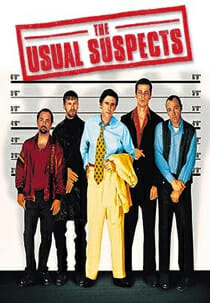 Year: 1995
Year: 1995
Director: Bryan Singer
Stars: Gabriel Byrne, Stephen Baldwin, Chazz Palminteri, Kevin Pollack, Kevin Spacey
Rating: R
The movie is a cheat and a fraud. It’s as manipulative as it is dishonest, but unlike many other far lesser films worthy of the same description, all this flick’s shamelessness is on purpose. When it was released The Usual Suspects left viewers gob smacked, staring at screens with expressions matching Michael Caine and Steve Martin on the runway at the end of Dirty Rotten Scoundrels: at first confused, then maybe a little angry, but then ultimately delighted by how fooled they’d just been. Perfectly paced, brilliantly scored by director Bryan Singer and editor/composer John Ottman—the film never lets the marks know they’re being conned by the irresistible ensemble or Christopher McQuarrie’s dark, mischievous script. And then like that … it’s gone… —Bennett Webber
22. Charade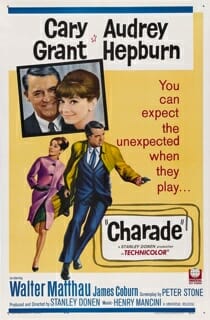 Year: 1963
Year: 1963
Director: Stanley Donen
Stars: Cary Grant, Audrey Hepburn, Walter Matthau, James Coburn
Rating: G
Cary Grant is the most charming male lead ever. Audrey Hepburn is the most charming female lead ever. Everything else is just bonus in this romantic thriller about a woman pursued in Paris for her late husband’s stolen fortune: the Henry Mancini score, the Hitchcock-ian suspense, the plot twists and Walter Mathau as a CIA agent. It’s a screwball comedy and an international spy thriller, and works equally as both. —Michael Dunaway
23. Blow the Man Down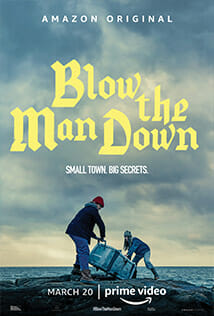 Year: 2020
Year: 2020
Directors: Bridget Savage Cole, Danielle Krudy
Stars: Morgan Saylor, Sophie Lowe, Margo Martindale, June Squibb, Will Brittain
Rating: R
It’s often the case that movies set in and around parts of New England try way too hard to hammer their cast’s speech patterns into half-assed, broadly drawn regional accents. These movies tend to suffer for it; the parody writes itself. Blow the Man Down doesn’t avoid the regionalization, because being set in and filmed around Maine it simply can’t, but directors and screenwriters Bridget Savage Cole and Danielle Krudy have not only written dialogue good enough to carry the weight of hokey Northeastern drawls, they’ve put together an ensemble capable of pulling back on that hokiness. The latter’s an impressive enough feat before taking the quality of Cole and Krudy’s craft into consideration. Blow the Man Down takes a few cues from the work of the Coen brothers, too, and perhaps even more from John Michael McDonagh, whose excellent 2011 film The Guard feels like spiritual kin. Here, sisters Mary Beth and Priscilla Connolly (Morgan Saylor and Sophie Lowe), having buried their mother, take over running the family fish shop in the port they call home, and after a series of unfortunate events become entangled in murder linking them up with the town’s seedy underbelly. What the film captures best about New England is the flinty reticence and secret-keeping. Everyone has something they’re compelled to hide, whether shame or grief or actual wrongdoing. Watching Blow the Man Down unravel all of those threads is its greatest pleasure. —Andy Crump
24. Vivarium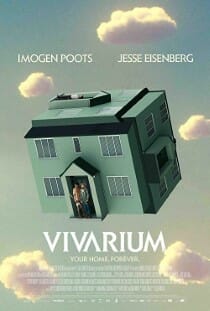 Year: 2020
Year: 2020
Director: Lorcan Finnegan
Stars: Jesse Eisenberg, Imogen Poots
Rating: R
A quirky real estate story, where first-time homeowners Tom (Jesse Eisenberg) and Gemma (Imogen Poots) get a lot more than they bargained for, Vivarium is a low-key sci-fi nightmare of the mundane in the vein of early David Cronenberg. Director Lorcan Finnegan’s film also functions as a relationship allegory, where Tom and Gemma find themselves stuck in a trendy neighborhood of cookie-cutter homes where starting a family isn’t just an expectation but something foisted upon them. It isn’t as grisly as something like Shivers, but more affecting in its surreal design and hopelessness. Eisenberg and Poots own the screen as a disintegrating couple coping in distinct ways to their newfound terrarium where they are observed, manipulated, and—perhaps most disturbingly of all—objectively provided for by unseen and undefinable forces. Its 2020 release feels especially fitting as repetition and hopelessness become permanent residents of the couple’s home. Genre elements seep into the film, accelerating in hiccups and starts that are as arresting as the film’s intentionally artificial design. Startling sound dubbing, odd colorizing, and a few genuine “Oh shit” moments make Vivarium a tight, nasty fable that would fit in with the best Twilight Zone episodes. —Jacob Oller
25. Master Amazon Prime Release Date: March 18, 2022
Amazon Prime Release Date: March 18, 2022
Director: Mariama Diallo
Stars: Regina Hall, Zoe Renee, Talia Ryder, Talia Balsam, Amber Gray
Genre: Horror
Rating: R
The legacy of racism forms the economic and ideological foundation of some of the nation’s oldest institutions of higher learning. The specter of slavery haunts the country, and Master isn’t here for an exorcism. Instead, coming out of HBO’s excellent Random Acts of Flyness, writer/director Mariama Diallo makes her debut with a scattershot yet damning nightmare. Her horror is one of symbols, situations and environments. The campus of Ancaster, a fancy-pants New England university, welcomes Black women with locked doors, blaring alarms and white whispers. It doesn’t matter if you’re Gail Bishop (Regina Hall, fantastic as always), a newly appointed Master AKA dean breaking that particular office’s color barrier, or Jasmine (Zoe Renee, who’s been excellent since Jinn), seemingly the only non-white student in the incoming freshman class. Wide-eyed type-A Jasmine and her heavy-browed indie roommate live in one of the haunted rooms making up seemingly every college campus; Gail’s new faculty digs are similarly pockmarked by the past. The problem is that these buildings have been around for a couple hundred years and the school mascot is a witch, so maybe everyone should be on the lookout for the supernatural. But it’s not ghosts that torment Jasmine and Gail. Diallo’s chapter-based descent into the Hell of American history, each circle moving past microaggressions and into more direct displays of hate, shows warring yet intrinsically linked experiences. Jasmine is cold-shouldered by Black cafeteria employees, surrounded by hard-R sing-along partygoers, and academically undermined by her Black literature professor (Amber Gray). Gail navigates tenure committees, portrait sittings and other arenas of prickly professionalism—all punctuated by signs of rot. In both stories, Diallo doesn’t skimp on the visual horror language, hitting the classics (“What’s under the bed?” “Why are there bugs?” “That painting’s weird.”) with straightforward framing and potent, simple camera moves that all but ask us to yell at the screen. One of the movie’s best moments comes when a piece of racist intimidation is cynically, hilariously undercut by a university diversity commercial. It’s in these moments that Diallo shows off her abilities with Flyness’ weaponized uncanniness. But as Master’s tone becomes more complex, so do its results. Diallo undoubtedly strikes at potent topics with skill and sets her collaborators up for success—Hall goes on a rampage, her administrative warmth exploding into an inferno—but its storylines and characters don’t convincingly coalesce. A third act tumbles to its bold conclusion, ending with a powerful ambiguity representative of the horror as a whole: Resonant, but so varied in its ambitions that it’s easy to get lost in its shadows. —Jacob Oller